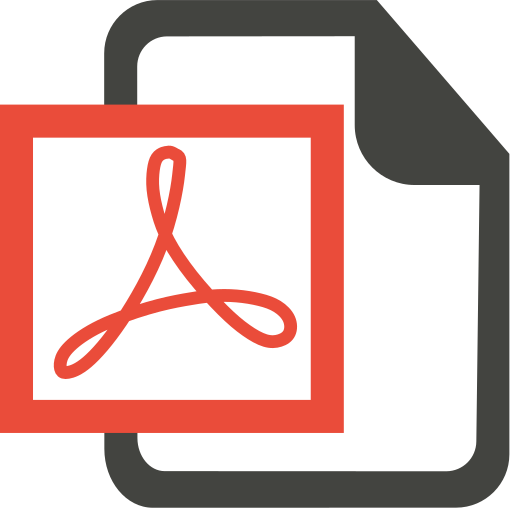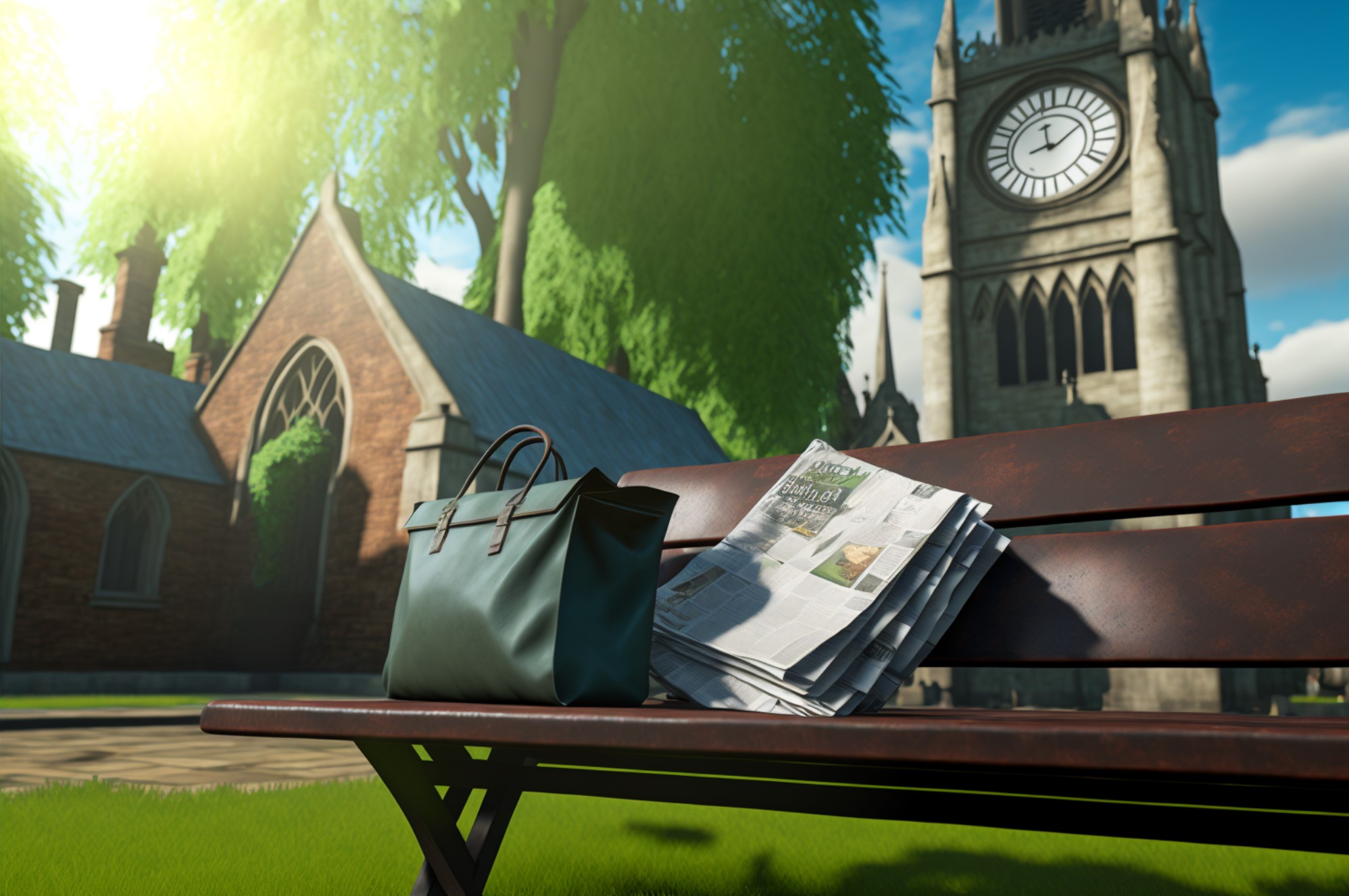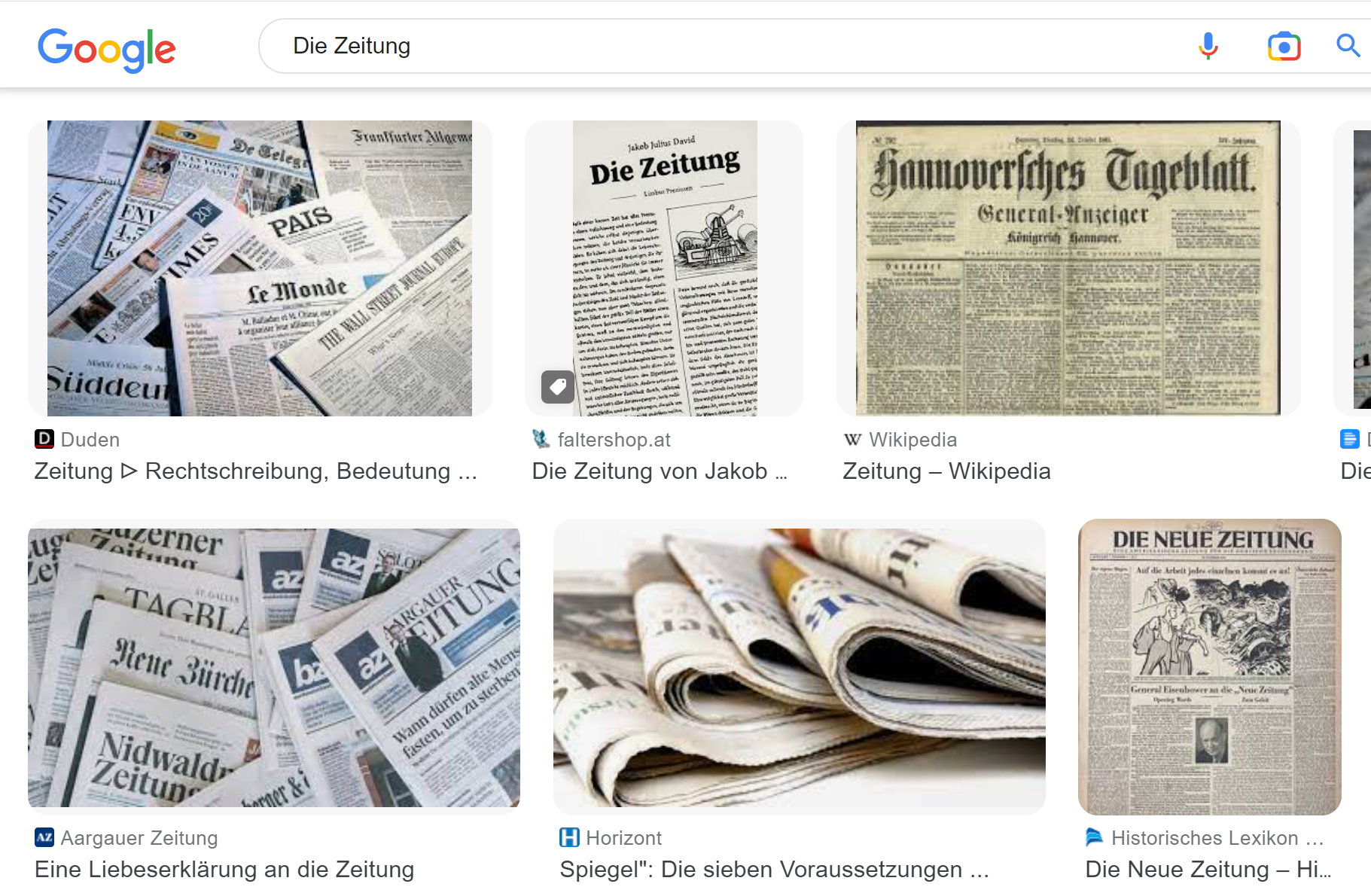Full Episode Audio
Listening Comp. Audio
Alright, this is Lesson #5 of Stress Free German. New image for you. Imagine a wooden bench. On the bench is a woman’s handbag, and a newspaper. In the background is a church, with a large clock. So we have five elements, all feminine: Bench, bag, newspaper, church, clock. Here’s just that first one in German…
Bank
As always, I ask you to be flexible in how you hear and process things. Like, if you recall that the English letters “ch” can sometimes be a “k” sound, like in the word “chemistry”….then the English word bench would sound like benk….Bank. Say it one more time and see the wooden bench in your mind.
Ok, the next word from our image was…Tasche. Here a bit of word play will help us make a connection. So imagine a woman who goes everywhere with her handbag–she takes it to church, to she brings it to school, to work…You might say she is really attached to her bag. She is really attached to her…Tasche. Try that sentence again: That woman is really attached to her….Tasche.
So a Tasche is a bag. For me, the first image that comes to mind is a woman’s handbag, but it’s also a shopping bag.
Let’s work with just those two words real quick. Imagine you’re walking for a long time and wanting to sit down. Your German friend points and says…
Hier ist eine Bank.
Here is a bench.
So you sit for a while and then continue walking. And suddenly she says…
Wo ist meine Tasche?
Where is my bag?
Next new word…what else was on that bench? Can you see it? Zeitung.
That first letter looks like the English Z, but listen to the pronunciation again. Zeitung
It’s like the English “ts”. As in, Whats up? Z…Zeit…Zeitung I love to get as literal as I can when learning a new word. Here, the word Zeitung is saying The time thing. Or, The thing related to time. Because on its own, the word Zeit is time. Good word for a newspaper, right? Think of The New York Times.
Now, our new words today are all feminine, so let’s try to incorporate the feminine article Die. Ask:
Where is the newspaper?
Wo ist die Zeitung?
Where is the bench?
Wo ist die Bank?
Where is the bag?
Wo ist die Tasche?
Now what was in the bankground, behind the bench? Can you see it? Right, a Kirche.
Again, we need to be flexible in how we process words. In English we have morphed that original German K sound into a “ch.” So what was once “kuh” has become “chuh”. The German word is Kirche, but English morphed that into a ch sound…church.
Ask: Where is the church?
Wo ist die Kirche?
Where is the bag?
Wo ist die Tasche?
Where is the newspaper?
Wo ist die Zeitung?
You’re doing great. And here’s our last new word. Can you see it in our image? A round thing on the church, with the numbers 1 through 12 on it, and two arrows to indicate the time? It’s an Uhr
Those letters look like U-H-R in English. Listen again? Uhr Is a clock or a watch.
And try to see the relation to the English word “hour”…as in sixty minutes in an hour.
So, try to ask: Where is the clock?
Wo ist die Uhr?
Excellent!
(music)
So these words like Der, ein, mein, dein….I’ve been calling them supporting words. So let’s listen to the feminine forms for those. Repeat after our native speaker: Die, eine, meine, deine. Do you hear the “e” at the end of all those? Listen again: Die, eine, meine, deine
I have some good news, guys. Great news, actually: These supporting words for feminine nouns don’t change when we do something to the noun.
(celebration FX) Hold on… (record scratch). Why aren’t you celebrating? This is huge. It’s like winning the lottery. Well, winning the grammar lottery. The supporting feminine words don’t change when we do something to them. (cheering FX)
Mind you, in other situations, like coming out from some feminine noun…then those supporting words will change. But not in these kinds of phrases: fist/palm They do not change in the “doing something to it” form. Okay. So… tell a friend:
I have your watch.
Ich habe deine Uhr.
I see the church.
Ich sehe die Kirche.
I want a bag.
Ich will eine Tasche.
I’m looking for a bench.
Ich suche eine Bank.
I need a newspaper.
Ich brauche eine Zeitung.
I slipped a new verb in there. Hopefully you were already familiar with it from those Comprehensible Input videos. If not, here it is again:
I need.
Ich brauche
Say: I need an apple.
I need an apple.
Ich brauche einen Apfel.
Apple is masculine, right? We see it in the park, near the man and the dog. We see it on the table, and by the fridge. Those were our masculine images. And needing an apple counts as doing something to it. So ein became einen.
I need a cellphone.
Ich brauche ein Handy.
Handy is neuter. Supporting words for neuter nouns don’t change when we do something to them. And neither do the supporting words for feminine nouns. Try to say…
I need a watch.
Ich brauche eine Uhr.
Cool!
TIP OF THE DAY
I wanted to follow up on that idea of using a translator app to evaluate your German speech. And again, it’s a decent substitute if you don’t know any native speakers. But what you do not want to rely on is one of these AI chatbots to give you language advice. I asked one of those things: Give me ten common nouns in German that are neuter. Nope. Couldn’t do it. It got like six out of ten. And when you correct it, it says, My apologies. Languages are hard for me.
Yeah, I can tell.
But the news isn’t all bad. Although the translate functions are unreliable, the image functions are great. Here’s how to leverage them. Let’s say you’ve just learned the word for newspaper. Remember what it is? Zeitung. Excellent. So, you put that into Google images and take a screenshot. Up top should be the words Die Zeitung, and then the six or so images of various German newspapers. Then label the screenshot THE NEWSPAPER.
How is this useful? Well, that image acts as a digital flashcard. When it’s time to practice some vocab, you see the thumbnail titled THE NEWSPAPER and you try to recall the word. And here’s the real tip: If you can’t recall it, don’t look at the answer. Instead cover it up and give yourself just the first letter. See if that jogs your memory. That’s another Golden Rule: Always give yourself the smallest hint possible. Ok, back to it…
Imagine giving a tour of your town. Say…
This is the park.
Das ist der Park.
This is the field.
Das ist das Feld
This is the church.
Das ist die Kirche.
Imagine explaining to a child what various things are. Say…
This is a tree.
Das ist ein Baum.
This is a glass.
Das ist ein Glas.
This is a newspaper.
Das ist eine Zeitung.
I see the dog.
Ich sehe den Hund.
I see the house.
Ich sehe das Haus.
I see the bag.
Ich sehe die Tasche.
Tell a friend:
I have your juice.
Ich habe deinen Saft.
I have your water.
Ich habe dein Wasser.
I have your watch.
Ich habe deine Uhr.
I’m looking for a refrigerator.
Ich suche einen Kühlschrank.
I’m looking for a gift.
Ich suche ein Geschenk.
I’m looking for a bench.
Ich suche eine Bank.
If you got all of those, you are doing incredibly well. And if you missed some of those, no problem. We’ll get lots more practice. But I would recommend going through these first five lessons one more time. Remember, this course is cummulative, so you need to master each lesson before moving on.
(music)
For today’s final topic, let’s look at a different verb conjugation. I’m sure you guys noticed early in these lessons that we’re only working with the Ich form of verbs. I see the dog. I have your beer, and so on. Well, it’s time now to expand on that. Now, if you’ve been studying German elsewhere, you’ve likely heard that German has different forms of you, depending on who you’re talking to. For now, we’re only going to be dealing with friends and family. People we’d speak informally with.
Ok, so: A German friend is giving you a tour of his neighborhood. He points to a house and asks…
Siehst du das Haus?
Ja. Ich sehe das Haus.
Based on just that one example, how might he ask: Do you see the park?
Siehst du den Park?
Did you say “den”? After all, Park is masculine, so the supporting words change when we do something to the word.
How about: Do you see the church?
Siehst du die Kirche?
Let’s look at another verb we know, again in this informal you form. What do you think she is asking?
Hast du eine Uhr?
Do you have a watch?
Can you guess how to ask:
Do you have a cellphone?
Hast Du ein Handy?
How about: Do you have a dog?
Hast du einen Hund?
Since grammar is all about noticing patterns–and not memorizing charts and declension tables–are we noticing any kind of pattern here at all? Well, yeah. Somewhat. If we’re saying Du, we hear a verb that ends with an “st” sound. Right? Du siehst. Du hast. Let’s see if that happens with today’s new verb. Remember this phrase?
I need a watch.
Ich brauche eine Uhr.
Any guess on how you might say: Yes, you need a watch.
Ja! Du brauchst eine Uhr.
(swell)
Let’s review those three “du” forms. Try to say:
Do you see a bench?
Siehst du eine bank?
Remember, with all of these we are speaking with a friend or close family member.
Ask: Do you have a glass?
Hast du ein glas?
You need a refrigerator.
Du brauchst einen Kühlschrank.
Same three verbs again. Ask…
Do you see the field?
Siehst du das Feld?
Do you have my water?
Hast du mein Wasser?
You need a bag.
Du brauchst eine tasche.
One last round: Do you see the window?
Siehst du das Fenster?
Do you have a newspaper?
Hast du eine zeitung?
You need a shelf.
Du brauchst ein Regal.
You’re probably tired of me saying it, but if you’re getting most of these then that’s incredible. Be sure to get the PDF from the site, StressFreeGerman.com. And I’ll see you in the next lesson.
Lesson PDF Download – Right click on PDF Icon – Save Link As…



I’ve been surfing for the best German lessons. Finally, I found you through Apple Podcast. I wonder what if you do a YouTube channel where most people like myself look for German lessons but end up with complicated lessons unlike yours.
Thanks, Mang. So glad you’re enjoying the lessons. We’re more involved in GooglePlay, iTunes and of course Spotify. There’s just so much noise and clutter on youtube…hard to get any traction there. Nevertheless, this ur channel:
https://www.youtube.com/watch?v=j3i5uTz_VqQ&list=PLsFM0jlsg2ZkW6jT014zAjAMZ0xrmdeIT
Really enjoying the lessons, great technique. Can’t stop recommending it to everyone I know that wants to learn German.
We really appreciate that, Halinah. Thanks for sharing your enthusiasm!
I have been struggling to find the more structured approach to learn German to build confidence with in. With 5 lessons I feel this is the course I was looking for. Amazing techniques building blocks, No long statements like any other podcasts which which makes me wonder what I heard. More to go and looking forward to at least speak in shops, markets and restaurants soon with upcoming lessons and volumes.
So glad to hear you’re benefiting from the course, Sushant. I look forward to welcoming you to Volume II.
Keep up the great work, and if you can, please try to share with others about SFG.
I’m only five episodes in but have already learned so much more in a couple of weeks than I have in a year of listening to Coffee Break German. I enjoy that podcast as well but this is much more structured and orderly. Thank you so much.
Thanks for the feedback! We’re definitely fans of structure, and helping people make tangible progress in German. 🙂
Hello, I purchased vol 2 and 3 and can access them easily on my computer. However, I like to do the lessons on my iphone. The only app that I find for your site does not have a members area (only 1-20), so logging in has been difficult. Is there an easier way? Thank you.
PS. the support functions didn’t seem to work which is why I am sending my message here.
Hi Joe, We responded earlier today via e-mail from support (@) stressfreegerman.com please look for that. We await your response.
Amazing series. I can’t believe how quickly I’m learning
Thanks for the kind words, Bob. I hope to see you in SFG Volume II!